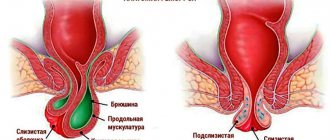Papaverine is an effective antispasmodic that is widely used in medical practice for various diseases. Papaverine suppositories are used for pathologies accompanied by spasm of the smooth muscles of hollow organs, for example, cholecystitis, renal colic, spastic colitis, bronchospasm, endarteritis, migraines and many other diseases. When administered rectally, the drug is quickly absorbed and its active components enter the bloodstream. The therapeutic effect occurs quite quickly.
Properties of the medicine
Papaverine hydrochloride suppositories, after administration into the rectum, affect the smooth muscles of the bronchi, lungs, large and small intestines, stomach, and uterus. However, the effect of the drug does not apply to the muscles of the skeleton and heart. After the product enters the body, these muscles work as usual.
Properties of the drug:
- elimination of smooth muscle tone in various pathologies;
- lowering blood pressure, dilating blood vessels;
- increased blood flow in all internal organs;
- normalization of heart rate;
- providing a sedative effect.
During childbirth, women are prescribed Papaverine suppositories to relieve cervical hypertonicity. Many people are interested in how to administer the drug vaginally or rectally? Papaverine suppositories are inserted into the patient's anus.
Is it possible to insert papaverine for hemorrhoids?
Hemorrhoids are varicose veins of the rectum. Lumps that form on the veins make it difficult for stool to pass through, causing discomfort and even pain during bowel movements. Thanks to Papaverine, it is possible to achieve relaxation of the intestinal muscles, which greatly facilitates bowel movements. In the initial stages of hemorrhoids, Papaverine is an excellent remedy to prevent the problem from worsening. In addition, the drug is often prescribed for constipation, as suppositories have a laxative effect.
Indications
What is the medicine used for? Papaverine suppositories are used for many diseases that are accompanied by pain. The drug is widely used in gynecology, urology, and surgery.
Main indications:
- all types and stages of hemorrhoids;
- headaches caused by vasospasm;
- pain syndrome in various diseases of the digestive system;
- renal colic;
- pathologies of the urinary tract – pyelonephritis, cystitis, urolithiasis, urethritis;
- bronchitis, pneumonia;
- pain in women during menstruation.
Papaverine helps relieve spasms in various diseases
Papaverine suppositories have a positive effect on the gastrointestinal tract during constipation and help normalize stool. The drug effectively fights migraines. For bronchitis, the medicine relieves spasm from the bronchi and helps prevent swelling of the mucous membrane.
Why papaverine injections?
In addition to tablets and suppositories, there is also a dosage form in the form of a solution for intravenous or intramuscular administration. This method of delivering medicine to the body is used when there is no time to wait for the drug to be absorbed through the gastrointestinal tract. Among these patients are pregnant women. They may be prescribed Papaverine by drip method. While staying in hospital for preservation, women receive regular doses of Papaverine, and the result can be monitored by an obstetrician in order to promptly make adjustments to therapy if necessary.
Mechanism of action
The therapeutic effect of Papaverine suppositories is ensured by suppressing the phosphodiesterase enzyme. Thanks to this, it is possible to relieve muscle spasms and relax muscle fibers. The medicine has an effect on the human genitourinary, digestive, and hepatobiliary systems, and also relieves vasospasm. The active component papaverine hydrochloride increases the lumen of blood vessels, thereby normalizing systemic blood pressure. After administration of the drug, its active component quickly penetrates the bloodstream. Papaverine hydrochloride is evenly distributed throughout the body, affecting the central nervous system.
Important! During use during pregnancy, the drug can penetrate the placenta to the fetus and enter milk during breastfeeding.
Composition and release form
The main active ingredient for all forms is papaverine hydrochloride.
The drug can be found in the following forms:
- injection;
- pills;
- suppository for rectal administration.
The tablets contain the following auxiliary components: sugar, potato starch, talc, stearic acid.
In the solution intended for injection, the excipients are: D, L-methionine, purified water, disodium edetate.
Rectal suppositories contain: hard fat, emulsifier No. 1, cosmetic stearin.
Contraindications
The instructions for use include a number of contraindications that must be taken into account when using the medicine. These include:
- presence of allergies to the components of the drug;
- increased intraocular pressure in glaucoma and other diseases;
- liver failure, accompanied by severe course;
- blockade of the heart muscle;
- old age of the patient;
- children's age up to 12 years.
Papaverine is prescribed by a doctor who must study the patient’s medical history and exclude all possible contraindications.
How to light candles
Where to insert Papaverine and how often can it be done? Suppositories should be used only as prescribed by a doctor. Typically, adults are administered 20-40 mg of the drug 2-3 times throughout the day. Sometimes a specialist may adjust the dosage depending on the diagnosis. Considering the question of how long the drug takes to act, it should be noted that on average the effect occurs after 30 – 40 minutes. Sometimes you have to wait longer for results. This depends on the characteristics of the disease and the individual qualities of the body.
The suppository should be administered according to the instructions.
Papaverine for tone: how many times a day
Depending on the condition of the pregnant woman, two schemes for using suppositories with papaverine can be prescribed:
- Use the drug strictly at night for 5 days in a row. A one-time dose is acceptable in situations where the tone of the uterus increases only from time to time.
- With constant tone, 3 doses are prescribed during the day. Preferably in the morning, after bowel movements, during the day and before bedtime. The duration of administration according to this regimen can only be regulated by a doctor.
With uterine hypertonicity
Increased uterine tone threatens premature birth. Papaverine suppositories help relieve spasms and relax smooth muscles. According to the doctor’s recommendation, a woman is given 2–3 suppositories throughout the day to tone the uterus. It is advisable for every pregnant woman to have this medicine in her home medicine cabinet, since when a spasm occurs, this drug will become an ambulance. The drug should be used carefully during treatment with other vaginal and rectal suppositories.
Sometimes the medicine is used among women in labor for false contractions. During this period, the woman experiences pain in the uterus and lower back, but this condition is only a harbinger of an imminent birth. To make a woman feel better, suppositories can be prescribed.
Papaverine suppositories during pregnancy: where to insert
In gynecology, Papaverine is often prescribed to pregnant women who complain of nagging pain in the lower abdomen. If the obstetrician confirms increased uterine tone, a threat of miscarriage is suspected, and therefore there is a need to relax the walls of the uterus. Papaverine is suitable for this. In certain doses, it allows you to eliminate the threat of miscarriage and bring the baby to term.
The drug, produced in the form of suppositories, is intended for rectal administration. Despite the fact that the effect of the drug is expected in the uterus, suppositories must be inserted into the rectum. Once in it, Papaverine will quickly be absorbed into the bloodstream and give the desired effect.
Possible side effects
Negative phenomena associated with the use of suppositories are extremely rare. This is evidenced by numerous positive reviews from patients and doctors who have tested the drug in practice. Sometimes during treatment with the product, minor itching and irritation occurs in the anal area. If the dose is greatly exceeded, the patient may experience the following complications:
- heart rhythm disturbance;
- dizziness;
- apathy and drowsiness;
- difficulty urinating and defecating;
- nausea, less often vomiting.
Treatment of the complications described above consists of blood purification and symptomatic treatment of the patient.
Important! If alarming signs develop during therapy with Papaverine, you should stop taking the drug and immediately visit a doctor.
Dosage and administration
The frequency of administration can reach 3-4 times a day in adults and children from six months of age.
Tablets are taken according to the following scheme, calculating the amount of active substance:
- patients from six months to 2 years – 1/8 tablet per 1 dose;
- patients from 2 to 4 years old – 1/6 tablet at a time;
- patients 5-6 years old – ¼ tablet;
- adults: 1-2 tablets per dose.
Suppositories are used for hemorrhoids, which are caused by thrombosis of the veins of the large intestine and muscle tone. Impaired intestinal blood flow reduces its ability to peristalsis, leading to cracks and other damage. Suppositories that contain fat, upon contact with the mucous membrane of the anal ring, turn into a liquid state, which greatly facilitates the process of administering the drug. By relieving rectal spasm, Papaverine increases its elasticity, normalizes peristalsis, and facilitates defecation. The minimum daily dose is 1 suppository per day, preferably at night. The dose should not be increased beyond 3 suppositories per day.
The ready-made solution, intended for intramuscular administration, has immediate bioavailability. The exact dosage must be calculated by the doctor, because it directly depends on the symptoms, age of the patient and concomitant diseases.
special instructions
When starting treatment with the drug, you should carefully study the instructions for use. It includes several special instructions that must be followed. These include:
- the medicine should be used with extreme caution in cases of severe renal failure;
- During treatment with suppositories, it is important to stop drinking alcohol;
- During pregnancy and lactation, suppositories are used under the strict supervision of a doctor. To date, there is not enough information about the safety of using the drug during this period;
- the active component of the drug can have a relaxing effect on the central nervous system, therefore, among people whose work activity requires increased concentration, the drug is used carefully.
In addition, if the patient is taking any other medications, be sure to inform the doctor.
Before starting treatment, it is important to read the instructions for the drug
Papaverine
Dosage form:
rectal suppositories.
Composition per suppository:
Active substance
: papaverine hydrochloride – 20 mg; base for suppositories: solid fat (Vitepsol, Supposir) - until a suppository weighing 1.25 g is obtained.
Description:
suppositories from white to white with a yellowish or creamy tint, torpedo-shaped.
Pharmacotherapeutic group:
antispasmodic.
ATX code: A03AD01.
pharmachologic effect
Papaverine hydrochloride is a myotropic antispasmodic agent.
It is an inhibitor of the phosphodiesterase enzyme and causes intracellular accumulation of cyclic 3′,5′-adenosine monophosphate and a decrease in calcium content, which leads to impaired contractility of smooth muscles and their relaxation.
The effect of papaverine hydrochloride on the central nervous system is weak, only in large doses it has a sedative effect.
Reduces the tone of smooth muscles of internal organs (gastrointestinal tract, airways, genitourinary system) and blood vessels and therefore has a vasodilator and antispasmodic effect. In large doses, it reduces the excitability of the heart muscle and slows down intracardiac conduction.
Indications for use
Spasm of smooth muscles: abdominal organs (with cholecystitis, pylorospasm, spastic colitis, attacks of cholelithiasis), renal colic, spasm of the urinary tract; peripheral vessels (with endarteritis); cerebral vessels (for migraines); heart (for angina) – as part of complex therapy); bronchi (with bronchospasm).
Contraindications
Hypersensitivity to the components of the drug, atrioventricular (AV) blockade, glaucoma, severe renal failure, severe liver failure, old age (risk of developing hyperthermia), childhood.
Carefully
(in small doses) is used for conditions after traumatic brain injury, chronic renal failure, adrenal insufficiency, hypothyroidism, prostatic hyperplasia, supraventricular tachycardia, shock conditions.
Use during pregnancy and breastfeeding
During pregnancy and lactation, the drug should be used when the benefit to the mother outweighs the potential risk to the fetus or child. During treatment with the drug, breastfeeding is recommended to be suspended.
Directions for use and doses
Rectally. The suppository is inserted into the anus (after a cleansing enema or spontaneous bowel movement), having previously freed the suppository from the contour packaging using scissors (cutting the packaging along the contour of the suppository). Use 1-2 suppositories 2-3 times a day.
Side effect
Possible allergic reactions, partial or complete atrioventricular block, ventricular extrasystole, decreased blood pressure, increased activity of “liver” transaminases, hypotension, drowsiness, constipation, eosinophilia. Inform your doctor if you experience any unwanted or unpleasant reactions or sensations.
Overdose
Symptoms
: diplopia, weakness, decreased blood pressure, drowsiness. Treatment: symptomatic (maintaining blood pressure).
Interactions with drugs
Papaverine reduces the antiparkinsonian effect of levodopa and the hypotensive effect of methyldopa. In combination with barbiturates, the antispasmodic effect of papaverine is enhanced. When used together with tricyclic antidepressants, procainamide, reserpine, quinidine sulfate, the hypotensive effect may be enhanced.
special instructions
During treatment with the drug, ethanol intake should be avoided. The vasodilating effect is reduced by smoking.
Impact on the ability to drive vehicles and machinery
During treatment with the drug, you should refrain from driving vehicles and engaging in other potentially hazardous activities that require increased concentration and speed of psychomotor reactions.
Release form
Rectal suppositories 20 mg.
4, 5, 6 suppositories in a contour cell packaging made of a two-layer aluminum-polyethylene film or a film made of polymer materials or a white PVC/PE film combined or a polyvinyl chloride film.
1, 2 blister packs together with instructions for medical use of the drug are placed in a cardboard pack.
Storage conditions
In a place protected from moisture and light at a temperature not exceeding 25 ° C.
Keep out of the reach of children.
Best before date
2 years. Do not use after the expiration date stated on the label.
Vacation conditions
Available without a prescription.
Analogues of the drug
How to replace Papaverine suppositories? Among the analogues of the drug, the following drugs can be distinguished:
- No-Shpa is a medicine that is used for diseases associated with spasm of the smooth muscles of internal organs and blood vessels, as well as for the treatment of periodic pain;
- Spazmolysin suppositories - inserted into the anus for pain syndrome arising from diseases of the gastrointestinal tract and other organs, cholecystitis, pancreatitis, cystitis and other pathologies;
- Spascuprel - used to relax the smooth muscles of internal organs in diseases of the stomach, intestines, pancreas, kidneys and other organs;
- Theophedrine ІС – used for bronchial asthma, obstructive bronchitis to eliminate bronchospasm and ease the patient’s breathing;
- GastroComfort is an antispasmodic and carminative drug that is prescribed to patients with diseases of the digestive system;
- Niaspam - used for irritable bowel syndrome, renal and hepatic colic, and other pathologies of the digestive system.
You should take any of the analogues only after examination by a doctor.
Self-medication often causes serious negative consequences.
Is it possible to drink papaverine during menstruation?
Periodic female pain associated with menstruation occurs due to contractions of the uterine muscles. This is how the organ gets rid of the overgrown endometrium, which was lined throughout the entire cycle, awaiting the attachment of the fertilized egg. Due to the absence of a fertilized egg, at the beginning of the cycle the level of hormones in the body changes, which causes emptying of the uterine cavity. For better rejection, the organ contracts, which causes severe pain in women. Papaverine, acting on smooth muscles, relieves pain and dilates blood vessels, which facilitates the release of blood clots. Papaverine is taken during menstruation according to two different schemes:
- if menstruation is always painful, you are allowed to take 1 tablet three times a day during the first three days of the cycle.
- If menstruation is usually painless, with occasional cramps, there is no need to take the drug as a course, a single dose is enough to stop the attack. If necessary, the dose can be repeated, but not earlier than 4 hours after the first use.
Patient reviews
Stanislav, Cheboksary “I was prescribed suppositories for exacerbation of hemorrhoids. The drug works quite quickly, relief occurs within 15 to 20 minutes. Papaverine is easy to find in any pharmacy, its cost is affordable. Over the course of several courses of therapy, I did not notice any side effects.”
Anastasia, Prokopyevsk “I was prescribed suppositories during pregnancy, when there was a threat of miscarriage. I lit one candle at night. In the ward where I was lying, this drug was prescribed to many girls. Papaverine does not cause side effects and relaxes the uterus well. The main advantage of candles is their low cost and availability.”
Marina, Cherkessk “At the age of 13, I started menstruating. This period is always very painful. She underwent many medical examinations, but doctors did not find any abnormalities. Papaverine suppositories save me. In the first days of menstruation, I put one candle in the morning and in the evening. Thanks to the drug, critical days pass easily. I haven't noticed any consequences yet. I recommend to everyone".
Natalya, Minsk “For many years I have been suffering from chronic cholecystitis, the disease is often accompanied by pain and other unpleasant sensations. One of the components of complex therapy prescribed by the attending physician is Papaverine suppositories. Despite its inexpensive cost, the medicine works great. The pain goes away within 10 minutes. I have been using the product for many years and suppositories have never let me down. “I heard a lot of negative feedback about the medicine, but I didn’t experience any side effects myself.”


